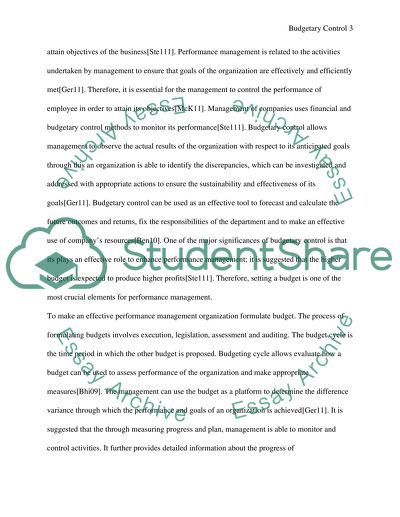Cite this document
(“Budgetary Control in the Organization Essay Example | Topics and Well Written Essays - 2000 words - 4”, n.d.)
Budgetary Control in the Organization Essay Example | Topics and Well Written Essays - 2000 words - 4. Retrieved from https://studentshare.org/finance-accounting/1625739-budgetary-control-is-part-of-overall-organisation-control-and-is-concerned-primarily-with-the-control-of-performance-the-use-of-budgetary-control-in-performance
Budgetary Control in the Organization Essay Example | Topics and Well Written Essays - 2000 words - 4. Retrieved from https://studentshare.org/finance-accounting/1625739-budgetary-control-is-part-of-overall-organisation-control-and-is-concerned-primarily-with-the-control-of-performance-the-use-of-budgetary-control-in-performance
(Budgetary Control in the Organization Essay Example | Topics and Well Written Essays - 2000 Words - 4)
Budgetary Control in the Organization Essay Example | Topics and Well Written Essays - 2000 Words - 4. https://studentshare.org/finance-accounting/1625739-budgetary-control-is-part-of-overall-organisation-control-and-is-concerned-primarily-with-the-control-of-performance-the-use-of-budgetary-control-in-performance.
Budgetary Control in the Organization Essay Example | Topics and Well Written Essays - 2000 Words - 4. https://studentshare.org/finance-accounting/1625739-budgetary-control-is-part-of-overall-organisation-control-and-is-concerned-primarily-with-the-control-of-performance-the-use-of-budgetary-control-in-performance.
“Budgetary Control in the Organization Essay Example | Topics and Well Written Essays - 2000 Words - 4”, n.d. https://studentshare.org/finance-accounting/1625739-budgetary-control-is-part-of-overall-organisation-control-and-is-concerned-primarily-with-the-control-of-performance-the-use-of-budgetary-control-in-performance.


